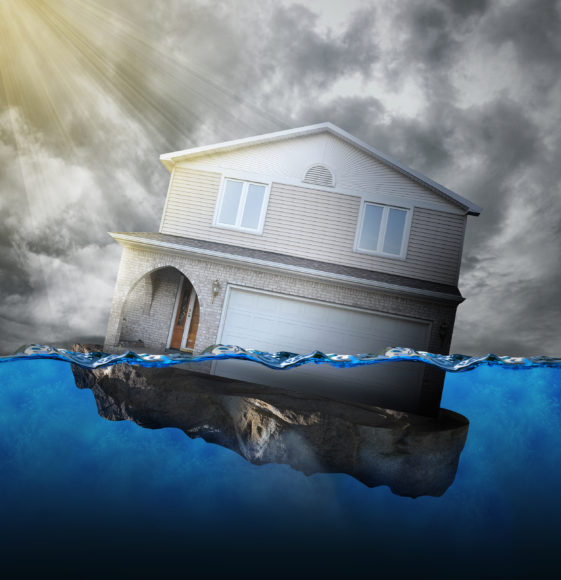Hurricane Florence could put pressure on U.S. Congress to extend the National Flood Insurance Program, but “it is still an open question as to whether it will lead to a comprehensive reform bill passing,” Robert Bradshaw, president and CEO of the Independent Insurance Agents of Virginia (IIAV), told Insurance Journal.
The program, administered through the Federal Emergency Management Agency, is the primary source of flood insurance in the U.S. with about 5 million policy holders across the country, Bloomberg reported. However, the NFIP remains more than $20 billion in debt, with some experts calling for reforms, the Bloomberg report added.
Indeed, Hurricane Florence could add to the NFIP’s roughly $20.5 billion debt, as Right Street reported, although in order to come close to using all of the program’s resources, Florence would have to approach the record $16.3 billion the NFIP paid out in 2005 for Hurricane Katrina.
While Insurance Journal reported that Hurricane Florence was downgraded yesterday to a Category 2 hurricane as its maximum sustained winds decreased to about 110 mph, according to NOAA, Florence remains a large and dangerous threat. Storm surge as high as nine feet in some places and extreme rainfall of 30-to-40 inches can be expected, with even a few tornadoes possible, according to NOAA.
Although the bulk of the storm centers on the Carolinas, severe coastal flooding due to Florence is a concern in areas of Virginia such as Norfolk and Virginia Beach, as Accuweather has reported.
With this in mind, Virginia Governor Ralph Northam earlier this week issued a mandatory evacuation order for coastal Virginia residents in Zone A – which encompasses the lowest-lying areas of coastal Virginia and the Eastern shore – in advance of Hurricane Florence. The evacuation order went into effect beginning Tuesday, September 11, at 8 a.m.
Bradshaw said he believes the issue of significant flooding in the Virginia Hampton Roads area is growing and needs more attention from consumers, businesses and governments as Zone A is considered a high-prone area for flooding even during normal events.
“There are several legislative studies going on, and it’s going to need much more attention,” he said. “Whether you agree with climate change or not, Zone A flooding is a fact and the zone is growing.”
Although he believes previous experience with flooding may have led insurers and agencies in Virginia to exercise better pre-planning communications ahead of any anticipated storm surge or flooding resulting from Hurricane Florence, “memories are weak,” Bradshaw said.
“There are still areas where the insurance industry can help that businesses generally don’t understand, such as business interruption insurance,” he said. “It’s not important, however…until it’s important.”
He added that he believes improving response time in severe flood situations means those in the insurance industry need to be considered “second responders” in emergency events such as this.
“During previous administrations, we participated in emergency pre-planning exercises with the insurance industry being ‘second responders’ as it were,” he said. “The sooner you can get the insurance adjustors into damaged areas, the sooner the recovery. We have a new administration here, and we need to press for these discussions to start again.”
That said, as the potential impact of Hurricane Florence is anticipated in the state, the Virginia Bureau of Insurance told Insurance Journal it is “confident that insurers are actively preparing for this storm.”
“The Bureau’s focus is first – to encourage everyone to prepare – and second – to deal with matters regarding damage after the storm,” a Virginia Bureau of Insurance spokesperson said in an emailed statement.
Bradshaw agreed that overall, insurers and agencies in Virginia took a much greater communications strategy on pre-planning for Hurricane Florence this month.
“The Independent Insurance Agents of Virginia also worked early on to alert agencies about dusting off their disaster plans and sending out reminders of emergency processes,” he said. “Now, it appears that at least Virginia has dodged the bullet, so for us, this is an emergency drill.”
Related:
- NFIP’s $20.5B Debt to Taxpayers Could Grow After Florence
- Hurricane Florence a Reminder of Flood Insurance Reforms Stalled in Congress
- How About a Real NFIP Renewal for Once
Topics Catastrophe Natural Disasters Agencies Flood Hurricane Market Virginia
Was this article valuable?
Here are more articles you may enjoy.



 A 10-Year Wait for Autonomous Vehicles to Impact Insurers, Says Fitch
A 10-Year Wait for Autonomous Vehicles to Impact Insurers, Says Fitch  Insurance Broker Stocks Sink as AI App Sparks Disruption Fears
Insurance Broker Stocks Sink as AI App Sparks Disruption Fears  Insurify Starts App With ChatGPT to Allow Consumers to Shop for Insurance
Insurify Starts App With ChatGPT to Allow Consumers to Shop for Insurance  ‘Structural Shift’ Occurring in California Surplus Lines
‘Structural Shift’ Occurring in California Surplus Lines 


